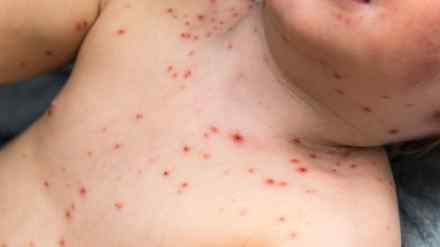
What is it?
- Chickenpox was once considered a rite of passage for most children, before the vaccine became available. However, when chickenpox does occur, it's highly contagious among people who aren't immune. Most people think of chickenpox as a mild disease — and, for most, it is. But, there's no way to know which infected child or adult will develop a severe case.
- Fortunately, the chickenpox vaccine is a safe, effective way to prevent chickenpox and its possible complications.
Symptoms
The best-known signs of chickenpox are:
- A red, itchy rash that initially may look like insect bites
- Small, liquid-filled blisters that break open and crust over
The chickenpox rash occurs in three stages. First, there are raised pink or red bumps (papules). These bumps will turn into fluid-filled blisters (vesicles). And, finally, the vesicles will crust over and scab. It's possible that all three of these stages may occur at once.
The rash may be preceded by or accompanied by:
- Fever
- Abdominal pain or loss of appetite
- Mild headache
- General feeling of unease and discomfort (malaise) or irritability
- A dry cough
- Headache
Common sites for the rash include the face, scalp, chest and back. The rash can also spread across your entire body, even into your throat, eyes and vagina. New spots continue to appear for several days. In healthy children, the disease is generally mild.
Risk factors
- Chickenpox, which is caused by the varicella-zoster virus, is highly contagious to people not immune to it. The disease spreads quickly, especially in locations where people are in close contact, such as child care facilities, schools and families. The virus is transmitted by direct contact with the rash or by droplets dispersed into the air by coughing or sneezing.
- A person who has chickenpox can transmit the virus for up to 48 hours before the telltale rash appears and remains contagious until all spots crust over. People who've been vaccinated against chickenpox are usually immune to the virus. The same is true of anyone who has had chickenpox in the past. People at risk of contracting chickenpox include anyone who hasn't been vaccinated or who has never had the disease.
Complications
Chickenpox is normally a mild disease. But it can be serious and can lead to complications, especially in these high-risk groups:
- Newborns and infants whose mothers never had chickenpox or the vaccine
- Teenagers
- Adults
- Pregnant women
- People whose immune systems are impaired by medication, such as chemotherapy, or another disease
- People who are taking steroid medications for another disease or condition, such as children with asthma
- People with the skin inflammation eczema
A common complication of chickenpox is a bacterial infection of the skin. Chickenpox may also lead to pneumonia or, rarely, an inflammation of the brain (encephalitis), both of which can be very serious.
Chickenpox and shingles
Anyone who had chickenpox is at risk of a latent illness called shingles. After a chickenpox infection, some of the varicella-zoster virus may remain in your nerve cells. Many years later, the virus can reactivate and resurface as shingles — a painful band of short-lived blisters. About one in 10 adults who've had chickenpox experiences shingles. The virus is more likely to reappear in older adults and people with weakened immune systems.
Shingles can lead to its own complication — a condition in which the pain of shingles persists long after the blisters disappear. This complication, called postherpetic neuralgia, can be severe.
Chickenpox and pregnancy
Other complications of chickenpox affect pregnant women. Chickenpox early on in pregnancy can result in a variety of problems in a newborn, including low birth weight and birth defects, such as limb abnormalities. A greater threat to a baby occurs when the mother develops chickenpox in the week before birth. Then it can cause a serious, life-threatening infection in a newborn.
Treatments and drugs
In otherwise healthy children, chickenpox typically requires no medical treatment. Your doctor may prescribe an antihistamine to relieve itching. But for the most part, the disease is allowed to run its course.
For people who have a high risk of complications from chickenpox, doctors sometimes prescribe medications to shorten the duration of the infection and to help reduce the risk of complications.
If you or your child falls into a high-risk group, your doctor may suggest an antiviral drug such as acyclovir (Zovirax) or another drug called immune globulin intravenous (IGIV). These medications may lessen the severity of the disease when given within 24 hours after the rash first appears. Other antiviral drugs, such as valacyclovir (Valtrex) and famciclovir (Famvir), also may lessen the severity of the disease, but have been approved for use only in adults. In some cases, your doctor may recommend getting the chickenpox vaccine after exposure to the virus. This can prevent the disease or lessen its severity.
If complications do develop, your doctor will determine the appropriate treatment. Treatment for skin infections and pneumonia may be with antibiotics. Treatment for encephalitis is usually with antiviral drugs. Hospitalization may be necessary.
Don't give anyone with chickenpox — child or adult — any medicine containing aspirin because this combination has been associated with a condition called Reye's syndrome.
Lifestyle remedies
To help ease the symptoms of an uncomplicated case of chickenpox, follow these self-care measures:
Don't scratch
Scratching can cause scarring, slow down the healing process and increase the risk that the sores will become infected. If your child can't seem to stop scratching:
- Put gloves on his or her hands, especially at night.
- Trim his or her fingernails
Relieve the itch and other symptoms
The chickenpox rash can be very itchy, and broken vesicles sometimes sting. These discomforts, along with fever, headache and fatigue, can make anyone miserable. For relief, try:
- A cool bath with added baking soda, uncooked oatmeal or colloidal oatmeal — a finely ground oatmeal that is made for the tub, not the stove
- Calamine lotion dabbed on the spots
- A soft, bland diet if chickenpox sores develop in the mouth
- Antihistamines such as diphenhydramine (piriton) for itching. Check with your doctor to make sure your child can safely take antihistamines.
- A soft, bland diet if chickenpox sores develop in the mouth
- Paracetamol or ibuprofen for a mild fever
- Don't give aspirin to anyone with chickenpox because it can lead to a serious condition called Reye's syndrome. And don't try to treat a high fever without consulting your doctor.
Prevention
The chickenpox (varicella) vaccine is the best way to prevent chickenpox. Experts from the Centers for Disease Control and Prevention (CDC) estimate that the vaccine provides complete protection from the virus for nearly 90 percent of young children who receive it. When the vaccine doesn't provide complete protection, it significantly lessens the severity of the disease.
The chickenpox vaccine (Varivax) is recommended for:
- Young children. Children receive two doses of the varicella vaccine — the first between ages 12 and 15 months and the second between ages 4 and 6 years — as part of the routine childhood immunization schedule.
- Unvaccinated older children. Children ages 7 to 12 years who haven't been vaccinated should receive two catch-up doses of the varicella vaccine, given at least three months apart. Children age 13 or older who haven't been vaccinated should also receive two catch-up doses of the vaccine, given at least four weeks apart.
- Unvaccinated adults who've never had chickenpox but are at high risk of exposure. This includes health care workers, teachers, child care employees, international travelers, military personnel, adults who live with young children and all women of childbearing age. Adults who've never had chickenpox or been vaccinated usually receive two doses of the vaccine, four to eight weeks apart. If you don't remember whether you've had chickenpox or the vaccine, a blood test can determine your immunity.
If you've had chickenpox, you don't need the vaccine. A case of the chickenpox usually makes a person immune to the virus for life. It's possible to get chickenpox more than once, but this isn't common.
The vaccine isn't approved for:
- Pregnant women
- People with weakened immunity, such as those with HIV or people on immune-suppressing medications
- People who are allergic to gelatin or the antibiotic neomycin
Talk to your doctor if you're unsure about your need for the vaccine. If you're planning on becoming pregnant, consult with your doctor to make sure you're up to date on your vaccinations before conceiving a child.
Is it safe and effective?
Parents typically wonder whether vaccines are safe. Since the chickenpox vaccine became available, studies have consistently found it safe and effective. Side effects are generally mild and include redness, soreness, swelling and, rarely, small bumps at the site of the shot.
References:
https://www.hse.ie/eng/health/az/C/Chickenpox/
https://en.wikipedia.org/wiki/Chickenpox
http://kidshealth.org/en/parents/chicken-pox.html
http://www.avivahealth.ie/members/health-information/chickenpox/


